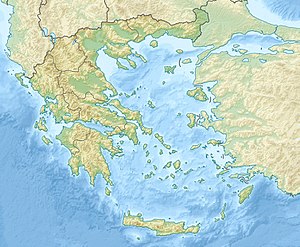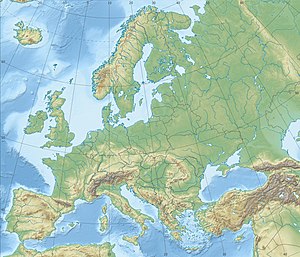 Global Information
Global InformationBattle of Thermopylae information
| Battle of Thermopylae | |||||||||
|---|---|---|---|---|---|---|---|---|---|
| Part of the Greco-Persian Wars | |||||||||
 Leonidas at Thermopylae (1814) Jacques-Louis David | |||||||||
| |||||||||
| Belligerents | |||||||||
Greek city-states
| Achaemenid Empire | ||||||||
| Commanders and leaders | |||||||||
|
Leonidas I of Sparta † Demophilus of Thespiae † Leontiades of Thebes |
Xerxes I Mardonius Hydarnes Artapanus[8] | ||||||||
| Units involved | |||||||||
Spartan army
| Persian army | ||||||||
| Strength | |||||||||
| 7,000[9][10] | 120,000–300,000[11][b][12] | ||||||||
| Casualties and losses | |||||||||
| 4,000 (Herodotus)[13] | c. 20,000 (Herodotus)[9] | ||||||||
 Thermopylae class=notpageimage| Location of Thermopylae within present-day Greece Thermopylae class=notpageimage| Location of Thermopylae within Europe | |||||||||
The Battle of Thermopylae (/θərˈmɒpɪliː/ thər-MOP-i-lee; Greek: Μάχη τῶν Θερμοπυλῶν, Máchē tōn Thermopylōn) was fought in 480 BC between the Achaemenid Persian Empire under Xerxes I and an alliance of Greek city-states led by Sparta under Leonidas I. Lasting over the course of three days, it was one of the most prominent battles of both the second Persian invasion of Greece and the wider Greco-Persian Wars.
The engagement at Thermopylae occurred simultaneously with the naval Battle of Artemisium: between July and September 480 BC. The second Persian invasion under Xerxes I was a delayed response to the failure of the first Persian invasion, which had been initiated by Darius I and ended in 490 BC by an Athenian-led Greek victory at the Battle of Marathon. By 480 BC, a decade after the Persian defeat at Marathon, Xerxes had amassed a massive land and naval force, and subsequently set out to conquer all of Greece. In response, the Athenian politician and general Themistocles proposed that the allied Greeks block the advance of the Persian army at the pass of Thermopylae while simultaneously blocking the Persian navy at the Straits of Artemisium.
Around the start of the invasion, a Greek force of approximately 7,000 men led by Leonidas marched north to block the pass of Thermopylae. Ancient authors vastly inflated the size of the Persian army, with estimates in the millions, but modern scholars estimate it at between 120,000 and 300,000 soldiers. They arrived at Thermopylae by late August or early September; the outnumbered Greeks held them off for seven days (including three of direct battle) before their rear-guard was annihilated in one of history's most famous last stands. During two full days of battle, the Greeks blocked the only road by which the massive Persian army could traverse the narrow pass. After the second day, a local resident named Ephialtes revealed to the Persians the existence of a path leading behind the Greek lines. Subsequently, Leonidas, aware that his force was being outflanked by the Persians, dismissed the bulk of the Greek army and remained to guard their retreat along with 300 Spartans and 700 Thespians. It has been reported that others also remained, including up to 900 helots and 400 Thebans. With the exception of the Thebans, most of whom reportedly surrendered, the Greeks fought the Persians to the death.[14]
Themistocles was in command of the Greek naval force at Artemisium when he received news that the Persians had taken the pass at Thermopylae. Since the Greek defensive strategy had required both Thermopylae and Artemisium to be held, the decision was made to withdraw to the island of Salamis. The Persians overran Boeotia and then captured the evacuated city of Athens. The Greek fleet—seeking a decisive victory over the Persian armada—attacked and defeated the invading force at the Battle of Salamis in late 480 BC. Wary of being trapped in Europe, Xerxes withdrew with much of his army to Asia, reportedly losing many of his troops to starvation and disease while also leaving behind the Persian military commander Mardonius to continue the Achaemenid Empire's Greek campaign. However, the following year saw a Greek army decisively defeat Mardonius and his troops at the Battle of Plataea, ending the second Persian invasion.
Both ancient and modern writers have used the Battle of Thermopylae as a flagship example of the power of an army defending its native soil. The performance of the Greek defenders is also used as an example of the advantages of training, equipment, and use of terrain as force multipliers.
- ^ "Gongaki (2021)" (PDF). Archived (PDF) from the original on 30 July 2021. Retrieved 22 July 2021.
- ^ Bradford (1980), p.162
- ^ Greswell (1827), p. 374
- ^ Cite error: The named reference
Tung & Tung, p. 239was invoked but never defined (see the help page). - ^ Cite error: The named reference
Marozzi, p. 74was invoked but never defined (see the help page). - ^ "After the Persian victory at Thermopylae, the Greeks and Persians met at a naval battle at Salamis."Bramwell, Neil D. (1932). Ancient Persia. NJ Berkeley Heights. p. 6.
- ^ The Persian Empire: A Corpus of Sources of the Achaemenid Period Archived 10 May 2023 at the Wayback Machine : page 278
- ^ Cite error: The named reference
cteswas invoked but never defined (see the help page). - ^ a b Herodotus VIII, 24 Archived 20 October 2022 at the Wayback Machine
- ^ "BBC Radio 4 – In Our Time, Thermopylae". BBC. Archived from the original on 26 April 2013. Retrieved 26 November 2014.
- ^ "Battle of Thermopylae | Date, Location, and Facts". Encyclopedia Britannica. Archived from the original on 6 October 2022. Retrieved 30 August 2019.
- ^ Barkworth, 1992. The Organization of Xerxes' Army. Iranica Antiqua Vol. 27, pp. 149–167
- ^ Herodotus VIII, 25 Archived 20 October 2022 at the Wayback Machine
- ^ "Herodotus on Thermopylae - Livius". Archived from the original on 4 October 2023. Retrieved 13 September 2023.
Cite error: There are <ref group=lower-alpha> tags or {{efn}} templates on this page, but the references will not show without a {{reflist|group=lower-alpha}} template or {{notelist}} template (see the help page).